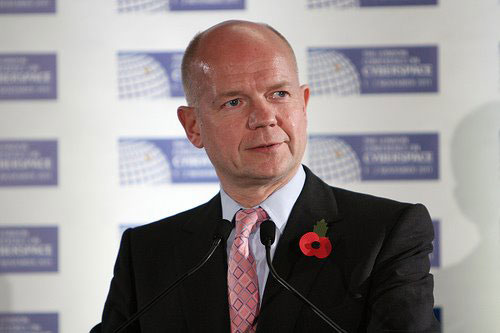British Foreign Minister William Hague arrived in Burma on Thursday to urge more democratic reforms in meetings with top government leaders in Naypyitaw, the capital.

Hague was scheduled to meet with President Thein Sein and government ministers before meeting with opposition leader and Nobel peace laureate Aung San Suu Kyi in Rangoon on Friday. Suu Kyi attended university at Oxford.
In a statement prior to his trip, Hague said he would urge more and quicker reforms. Britain won't promise any immediate changes in European Union sanctions on arms sales, asset freezes or travel bans, and the government must address key core issues before more normal relations can exist, he said.
"We hope to see the release of all remaining political prisoners, free and fair by-elections, humanitarian access to people in conflict areas and credible steps towards national reconciliation,” he said in the statement. "The release of some political prisoners, the dialogue with Daw Aung San Suu Kyi, improvements in media freedoms, and changes to legislation that have enabled the National League for Democracy to participate in this year’s by-elections are welcome reforms which we urge the government to build on.”
As a former colonial ruler, Britain has had long relations with Burma. It recently pledged 185 million pounds (US$ 289 million) over three years to fund health and education projects, making it Burma’s largest bilateral aid donor. The U.K. channels funds only through non-governmental groups.
Britain has maintained a tough stand on human rights issues in Burma, but expressed guarded optimism after the release on October 12 of 230 political prisoners, with the freedom for the remaining political prisoners a key demand for the lifting of sanctions. A commutation of prison sentences this week did not adequately address the issue of political prisoners, said British diplomats.
Britain believes there are likely between 591 and 1,700 political prisoners held in Burmese jails. An accurate figure is difficult to gauge because of Burma’s failure to acknowledge it has political prisoners and a lack of prison transparency.
The two-day visit by Hague is the first by a British foreign minister since the military seized power in 1962.


